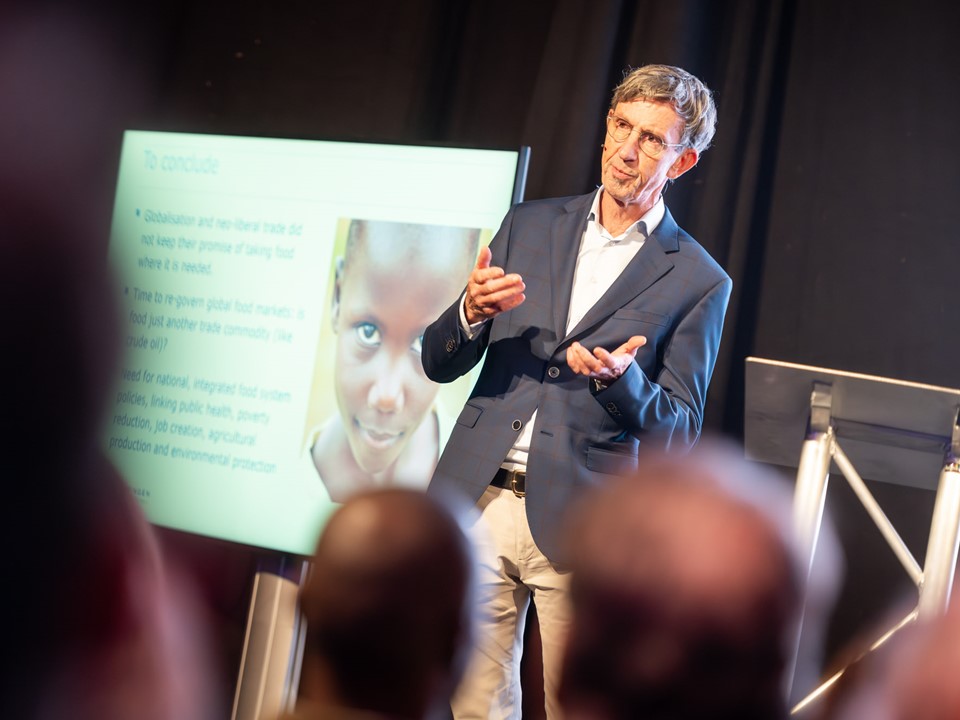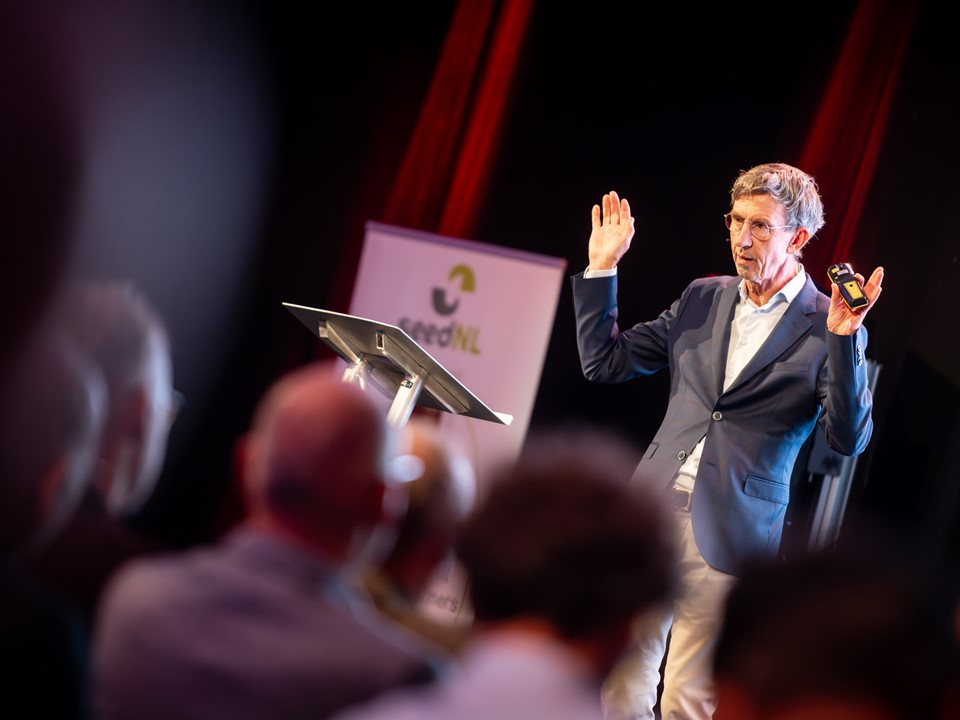Food systems transformation

Food systems transformation by informal sector & added value at the place of production (Africa)
Bart de Steenhuijsen Piters works at Wageningen Economic Research on food system transformations. He leads innovative research teams, provides policy advice, raises research funds, and coordinates large projects relating to food systems and their transformation processes. He has a keen interest in the political economy of food systems and the role of the informal sector in market forces. During our symposium, Bart first explained what food systems are and what initiates transformation. Afterwards he zoomed into Africa, explained informal markets and how a minority of smallholders can realise food systems transformation. Finally Ms. Margaret Shava, ambassador of Kenya to the Netherlands, righteously pointed out that value should be added at the place of production (Africa).

Evolution perspective on agriculture & food systems: society decides
Thirty years ago, the goal of agriculture was to produce food and create a living for our farmers. These days we seem to be obsessed with big complex questions on food system transformation and we get confused about agriculture. Over time the perspective on agriculture has evolved: it is now seen as part of a wider system. In this system, other elements also play a role, such as sufficiency, affordability, safety, healthiness, diversity of food, environment, etc. However it’s not so straightforward in some parts of the world, where it's more important to produce enough food than to protect the environment. Whereas in other parts of the world, it's maybe more important these days to protect the environment than to produce all that food. Thus, in each context, a food system has to create certain priorities, and basically, society decides which priorities come first.

Understanding the problem and what is a food system?
If you consider it globally, food systems do have problems. If you look at the global food system, and we take one particular outcome, which is food and nutrition security, we don’t seem to do very well. In spite of all the technology and innovation that we have, we’re not doing particularly well in terms of global food and nutrition security. I think innovation is at a top level, although it didn't solve the world’s food and nutrition problems. That's mind-blowing. We, as humans, can't solve this issue with all the technology in the world. Something else is bothering us. Our global food system has other types of problems, so let's try to understand what is preventing us from solving that problem.
In order to do so, we first have to understand what a food system is and what makes it move or not move. In the food system, there are activities, people, actors, and the supply chain. That's the food system itself. Surrounding it, there are influences: such as environmental, physical, and socio-economical and political drivers. Basically, that's a food system. It's all the actors and the activities, from production, the farmers, to consumers, as well as the markets and the institutions in between. A food system is a man-made construction. It's not logistics, forget about that. It's us, we are the food system. It's actors, all the segments, and groups of people that depend in one way or another on that system. So from farmers to consumers and everybody in between. These people are interrelated. We call those value chains.
Food system dynamics: human behaviour difficult to predict
Food systems are never static. Actors may move, value chains may change, the drivers may take different positions, and the food system may be reshaped into different forms. That's the reality in which we live. In the food system, there are leverages. If you push somewhere, there can be changes. For example, if we reduce VAT on fruit in England or the Netherlands, this could increase the consumption of healthy food. We've also seen that the EU policy on nitrogen, which has been a real leverage, has caused the Netherlands government to feel obliged to start reducing the number of livestock in the country. Then the system starts to move. That's what we call initiating a possible transformation. We don't know for sure, but it could.
Those changes may have two different effects. They can be synergetic, meaning that there are positive effects between actors and components of the system. That's what we want. Alternatively, very often, there may be trade-offs, and these trade-offs are often unforeseen and can be negative. It's very difficult to predict that, because it's human behaviour, and human behaviour is the most difficult thing to predict. Nobody predicted that so many farmers would act on the EU Farm-to-Fork policy in the Netherlands. It wasn’t predicted, and it happened.
Who controls the system and how to transform it?
The food system is similar to an orchestra, and we are all actors. We are all playing an instrument. Is it somebody at the front conducting the tune of the food system? In other words, is there somebody who controls the system? It's so important to us. Is anybody in control of the food system? Actually, there's a whole science called political economy that studies all these forces, relationships, and powers of the actors in that economy. Although it's so important to us, we don't know who controls our food system…
Food system transformation is not an easy thing. There are four different ways of thinking in terms of how to do this. The first opinion says a transformation is something you can engineer. If you put the right people around the table, they engineer it and say: "food systems need to be like this”. They are the optimistic ones. Other people say: "No way. Only the private sector can do that because they have the power to shape our food system. Our food system is the way the private sector designed it for us. It's not the government, and certainly not me”. That's the second opinion. The third opinion is that there's no way. Nobody engineers food systems, it's impossible, random and chaotic. There are so many stakeholders that there is no orchestra. The fourth one is that if you put all the different stakeholders around the table, they can negotiate a new food system. It’s nice to know that if ever you're around a table with somebody, you're likely to have somebody at the table with any one of these four opinions. And it helps you to realize this.
Lessons from the Dutch food system transformation: shift in power
Immediately after the Second World War, the Netherlands had a shortage of food. We had to rebuild our agriculture, and it took us 20 years to go from a shortage to oversupply. Our food system has been very dynamic over time. The changes in our food system have always been referred to as highly technological. But what is more important is that - every 10 years – there has been a shift in power. First, the government was in power right after the Second World War. Then came the co-operatives, farmers reunited and created very powerful cooperatives. Afterwards came the retailers, they took over from the cooperatives. Then came the input suppliers, the national and, more recently, international multinational input suppliers came into power. Recently, let's say in the last 20 years, it became more chaotic because more and more influential players and agencies entered our food system, including environmental agencies, which also took over a little bit of power. Nowadays, we simply no longer know and that is a problem. The fact that there is a new player deformity in the power structure of our food system, plus the fact that some of the agencies seem not to commit to the transformation that we, as a society would like, makes it very difficult to achieve progress with our transformation.

Africa: paying the price for Russia’s war and informal markets
We are now heading for Africa. It's good to understand that Russia’s war with Ukraine blocked a lot of exports of cheap wheat and other food items, but it is also symptomatic of dysfunctional global food markets. It is more important to realize that this showed something that was hidden: that many African consumers do depend on the supply markets, which cannot provide them with the food they need. That's a different perspective. They were very happy with that very cheap wheat in times of stability, but if anything happens with a resulting increase in food prices, they are also the first to pay the price of that increase. Then poor people, especially in urban centres, can no longer access that food. They were the most vulnerable. Living far away from Ukraine, they paid the price of this particular conflict. That's a bit of a strange but inconvenient dependency. These international trades could no longer assure them.
Now, it’s not entirely right to say that Africa depends on international markets for all of its food. That only applies to wheat, palm oil, and rice. For many other products, Africa is still more or less self-sufficient or able to produce for its own populations. Africa exports a lot of raw materials to other continents, where they are processed into high-value products. It also has to be mentioned that, for many other crops, we hardly know what's happening because those are informal value chains where more than 80 percent of all that is produced is not measured at all, so we don't even know what is being produced, traded, and consumed.
Production by smallholders: majority can’t, but minority can feed African consumers
When we think about agricultural production, we often think smallholders have to feed the consumers in Africa. Can these smallholders perform? I'm afraid that the majority of the smallholders will never lift themselves out of poverty. Never. This is for many reasons, because the margins on primary production will never allow them to lift themselves out of poverty. Too many of these farmers are too impoverished to make the necessary investments in terms of intensifying their land use.
On the other hand, a minority—less than 30 percent of the smallholders—can achieve this. That's the optimistic part of the story. If the other 70 percent move to alternatives outside agriculture, then that 30 percent can take over that land, use the land more intensively by investing in it, and then it is possible. However, the condition will be that these consumer markets are re-governed and provide more conducive conditions.
Smallholders are the drivers of food system change: we need to understand them
I'm confident that this minority of smallholders can indeed meet, maybe not all, but most of the demand from the growing urban populations for healthy food. You have to realize that these production models will be operating in informal sectors of the food system. These trade systems are effective, but are they efficient? I'm doubtful. We don’t really know who the smallholders are; they are not registered. They are not supported by the government or service providers. They will remain informal in the future. Yet these minority of smallholders are the drivers of food systems change. They are not a problem, our understanding of them is the problem.

Transformation in African food system possible, but help is needed elsewhere
To conclude, it's time to re-think governance in global food markets, because food is not another trade commodity. It's not like crude oil. There's a need for national integrated food system policies that every country needs, linking public health, poverty reduction, job creation, agro-production, and environmental protection. That is what we meant by a food system, and that requires its own policy. In Africa, major attention is needed to create decent jobs and provide food safety nets for the poor.
I'm quite sure, and I would like to stress this in an optimistic tone, that African farmers can meet much of the domestic demand for healthy food. I’m not saying we should always produce our own food at all costs. That is also stupidity. We need to always look for a balance between international, regional, and domestic production, finding a balance between the three. Transformations in the African food system require solutions elsewhere, in the larger political economy and international trade relations. They cannot solve the problems on their own. Don't leave these farmers to solve all the problems. They need solutions higher up and in other parts of the economy, and we must unlock the potential of the informal economy in Africa.
Critical success factor: adding value in Africa (by Ms. Shava, Kenyan ambassador)
“My name is Margaret Shava, I'm the ambassador of Kenya to the Netherlands. I have a comment which I wish to link to what Rob de Wijk said with regard to values. When we speak about critical raw materials, where are they being drawn from? A lot of them come from Africa, but they are needed in this part of the world. The transformation of the African food system and the strategic value of food cannot be separated from the broader context. The money needed to transform African food systems is not being sent fairly to Africa. Value is not being added at the place of production (Africa). Trade laws force us to add value on the Western side of the world. That is one of the critical factors affecting food systems.”
